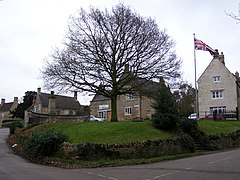Gretton, Northamptonshire
| Gretton | |
|---|---|
 Village green |
|
| Gretton shown within Northamptonshire | |
| Population | 1,285 (2011) |
| OS grid reference | SP9094 |
| District | |
| Shire county | |
| Region | |
| Country | England |
| Sovereign state | United Kingdom |
| Post town | Corby |
| Postcode district | NN17 |
| Dialling code | 01536 |
| Police | Northamptonshire |
| Fire | Northamptonshire |
| Ambulance | East Midlands |
| EU Parliament | East Midlands |
| UK Parliament | |
Gretton is a village in the English midlands county of Northamptonshire. It is in Rockingham Forest and overlooks the valley of the River Welland and the neighbouring county of Rutland. At the time of the 2001 census, the parish had a population of 1,240 people, increasing to 1,285 at the 2011 census.
It is near the town of Corby and the Rockingham Motor Speedway. Gretton takes its name from the phrase "Great Town".
The village is noted for having the tallest church tower in Northamptonshire, and the second-oldest running pub in Northamptonshire, the Hatton Arms. The Hatton Arms was recently renovated.
Gretton is one of the few villages to retain its stocks and whipping post, which can be found on the village green. The last recorded use was in 1858 when a villager was put in the stocks for six hours after failing to pay a fine for drunkenness.
Iron currency bars from the Iron Age have been found, and the Romans also worked the ironstone deposits. There were ironworks here in Edward the Confessor's reign in the 11th century, when Gretton was a royal manor, and the industry came to the fore again from 1881 to 1980, providing ore for Corby's steel works.
Most of the earlier houses - a fair number dating from the 17th century - are built of local limestone, sometimes banded with darker ironstone and roofed with thatch or Collyweston stone slate.
The buildings in Gretton provide a wide variety, ranging from the centuries-old 'Corner Cottage' in Arnhill Road, to a relatively modern housing estate on the south-east side of the village.
The Old School House, built in 1853, was the first purpose-built school in the village. The infants' classroom at the east end housed 70 children at times. The school operated until 1908 when the present school in Kirby Road was opened. Subsequently, it was the village community centre before being converted into a private house in the 1970s.
Barn House, in High Street, is one of the few houses in the village which retains its thatch. In the 1940s there were about 40 thatched houses, now there are merely a handful.
...
Wikipedia

